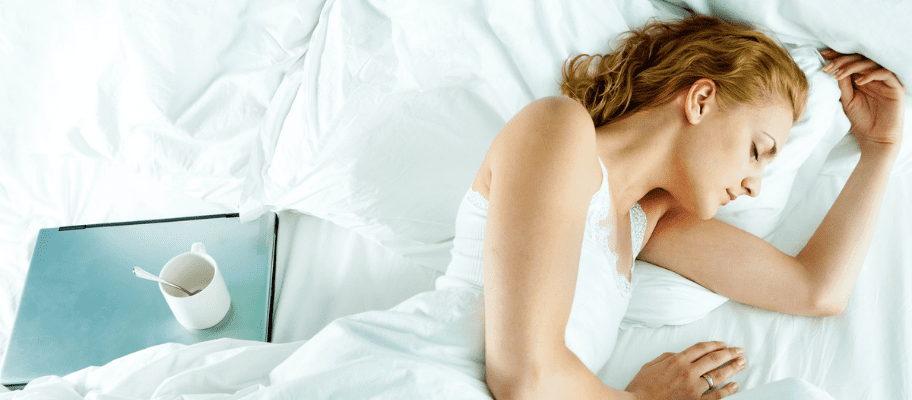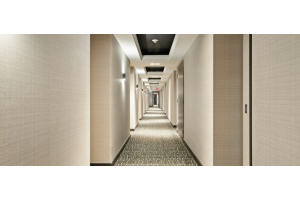We use cookies to give you the best possible experience. To accept cookies continue browsing, or view our Cookies Policy to find out more.
Why Do You Sleep Better In a Hotel?

If you take some time to stop and think about the best night’s sleep you’ve ever had, it’s more than likely that your answer would be that it was in a bed away from home. Unless you make it a habit at staying over at friends' homes, this usually means a bed in a hotel or B&B. We often feel rested and refreshed when we check out from a hotel, as we’re usually going there in order to get a break from our daily lives.
But what makes staying in a hotel so special that you’ll end up having a long, restful sleep? Let’s find out.
A Hotel Room Is a Haven That Removes The Usual Distractions
Forget about fine quality linens and the comfort of the hotel room for a second. Simply the fact that you’re away from your home and the tedium of our daily routines can help you get a better night’s sleep.
When you’re in a hotel, you don’t have to worry about all the little unfinished tasks that you haven’t had time to do, such as taking the bin out. You can simply relax in the knowledge that all those monotonous tasks that we put off are fully catered for.
Have you got pets or children? It sounds obvious, but simply having a night away from your dog clambering up on your bed or a screaming child waking you up in the middle of the night is conducive to a great night’s sleep. Speaking as a parent of a young child, I can easily say that a night away in a hotel while you leave your child with a family member or sitter is a relaxing night that many parents may walk over hot coals just to experience!
A hotel room is a perfect escape from everything. It’s a calm, relaxing, clean, and clutter-free environment that’s carefully designed to make you feel as rested as possible. That’s provided the hotel knows what it’s doing, of course, because I’m sure we’ve all stayed in a dodgy hotel that we’d rather just forget about at some point in our lives.
The Hotel Room Environment Is Perfectly Crafted For Sleep
The best hotels put a lot of thought into making sure their guests have the best sleeping experience possible. For example, hotel rooms often feature air conditioning as a cooler room helps you sleep better.
The level of light in the room also has a direct impact on the quality of sleep, so you’ll often find blinds or blackout curtains to ensure light pollution isn’t keeping you awake. A dimmer switch or lamps around the room can also help the guest create the perfect level of light in the run-up to going to bed.
Hotel Bedding Is Always Clean & Fresh
There are few better feelings than when you’ve just washed your bed sheets and you’re climbing into bed to use them for the first time. That crisp, clean feeling can instantly make you feel more relaxed. At home, it’s common for people to not replace their bedding as often as we should. We lead busy lives and it’s not something that’s always at the top of our priorities. Due to this, climbing into bedding that hasn’t been washed for a while can have an effect on the quality of our sleep. In a hotel, you don’t have this problem.
Hotels have stringent cleaning policies – especially more so since the pandemic – and will wash their bedding regularly. Due to dozens of guests using the same bedding over the course of few months, bedding is washed far more regularly than the washing we do at home. But, due to this constant use and regular washing, hotel bedding needs replacing more often than bedding at home. So, you’re more likely to be sleeping in brand new bedding that still retains its original quality in a hotel than you would be on top of that home bed sheet that you haven’t replaced in over a year (pro tip: we’ve got some quality bed sheets if you need them).
Hotels Use Quality Bedding
As previously mentioned, hotels will replace bedding a lot more often than we would at home. But that doesn’t mean that hotel bedding is of lower quality. In fact, it’s the opposite. Hotels will look for the best quality bedding that’s capable of withstanding consistent use by many people and capable of holding up against regular washing cycles.
Hotels, especially hotels with hundreds of rooms, will often outsource the cleaning of bedding to laundries, which carry out rigorous commercial washing processes that we simply wouldn’t follow when we use our humble home washing machines. So, hotels will look to purchase their bedding from suppliers like us, Vision Linens, as we craft bedding capable of retaining its quality over the long-run. So, when you’re looking to buy bedding from your home, it’s always worth looking to buy bedding that the best hotels use, as you can be assured you’re getting the finest quality.
Why Do I Sometimes Have Trouble Sleeping During The First Night In a Hotel?
Despite everything that a hotel does to make your stay as comfortable as possible, there may be occasions when you struggle to fall asleep on the first night of your stay in a hotel. This is known as the ‘first night effect’. Don’t worry, it’s not just you, as there’s actual science behind this.
A Brown University study found that the left hemisphere of our brain remains more active than the right hemisphere on the first night in an unfamiliar place, especially during the deep sleep stage. On the second night, there was no significant differences between either hemisphere of the brain.
One of the conclusions we may be able to take away from this study is that the fact you are sleeping in a brand new place may lead your brain to be on a higher alert than it would otherwise be when you’re sleeping in a familiar place such as your bed at home.
This may mean that if you’re only staying in a hotel for one night then you may have a less restful sleep than you would have if you’re staying in a hotel for multiple nights. However, it doesn’t mean your sleep will always be terrible if it’s just a one night stay. This is just an interesting study that could explain one of the reasons why your sleep may not be as good as you expected it to be.
How Do I Get Better Sleep In a Hotel?
While everything above should be common traits in hotels, it’s not always the case that they’re going have everything to suit your particular preferences. Plus, if you do suffer from the ‘first night effect’, there are a number of things you can do to make your sleeping experience that much better.
Check the thermostat and air conditioning: Hotels usually set the temperature to the most comfortable level for sleeping, which is around 18 degrees Celius (65 degrees Fahrenheit). However, always check what temperature the thermostat in your hotel room is set at or if the air conditioning is blasting out freezing cold air (or not on at all). But everyone has different preferences when it comes to room temperature, so set the one you’re most comfortable with.
Try to get a quiet room: You’d expect all hotels to be quiet, but sadly that’s not the case. Try to request a room that is that in an area that’s located away from being above busy streets or areas with nightlife, and away from commonly used areas such as elevators or ice machines.
Use white noise: There are white noise machines that help you sleep available, but if you’re looking for something a little more portable then there are also various phone apps you can download. Just make sure that the white noise is on during the entirety of your sleep, as a disruption could wake you up (plus, you don’t want to be looking at the blue light of your phone in the middle of the night).
Only use the bed for sleeping: This is the same advice that’s often given for when you’re at home. If you use the bed to do some work or to watch TV, your brain can struggle to associate the bed with sleep, and you end up lying awake for ages. It’s also a good idea to completely unplug before bedtime, such as turning on the TV or putting your mobile phone away. Instead, why not read a book or magazine?
Ensure that it’s dark enough: While we’re not all overly sensitive to light, having any source of light can be distracting when you’re trying to sleep. Make sure the curtains or blinds are completely closed and turn off any lights before you fall asleep.
Want to create that luxury hotel sleeping experience at home? We’ve got the perfect article for you.
A good night’s sleep is crucial for us all, so a hotel should ensure that they’re doing everything they can to give their guests a sleep that will leave them feeling utterly satisfied.
For more tips on how hotels can create the ideal sleeping environment, be sure to read our science of sleep article.






